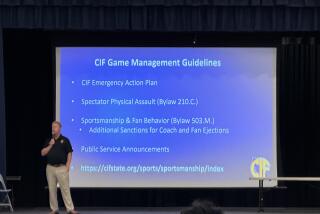Play Ball! : Facing Pressure, Rancho Niguel Little League : Yields to Parents on ‘Safety’ Ball and OKs Switch
- Share via
LAGUNA NIGUEL — Faced with mounting parental pressure and national media attention, officials of a Little League chapter here have backed down and authorized the use of a so-called “safety” ball for the rest of the season.
After threatening to expel coaches who attempted to use the RIF (reduced injury factor) ball in the final five games of its 7- and 8-year-old division, board members from Rancho Niguel Little League agreed to the switch.
“They called us up and said, ‘You have our blessing to use the RIF ball the rest of the season,” said Felicia Breshears, whose twin sons play in that division. “I was flabbergasted. I was shocked. They came around 180 degrees.”
But Jeanne Peterson, one of 80 parents who signed a pro-RIF ball petition, was upset that league authorities only paid attention to parents after the news media wrote about the conflict.
She called it a case of “too little, too late. As far as I’m concerned, they’re a day late and a dollar short.”
The conflict escalated to a point where it captured the attention of national news media. After a story appeared in The Times, local radio and television stations picked it up.
On Tuesday, the parents spent the day with a crew from ABC’s “Good Morning, America,” which plans to air the segment in the coming weeks. Dan Rather and the “CBS Evening News” have also expressed interest, Breshears said.
“Had they allowed us to use [the safety ball] from the start--which is what we wanted--we would have never found out how many parents nationwide have the same complaint we do,” said Peterson, whose husband, Erik Peterson, sells RIF balls for a living.
Dayton Meyer, the president of Rancho Niguel Little League, declined to comment Wednesday. Parents in the league said one of the mothers hired an attorney, who wrote a letter stating that if the mother’s son were injured, the board would be held responsible.
“No comment to that either,” Meyer said.
League officials note, however, that they have always used a safety ball in their 5- and 6-year-old division, otherwise known as T-ball, and in their 6- and 7-year-old division, known as coach-pitch.
They opted to use the traditional hardball starting with the machine-pitch division and in the three older divisions, believing that, sooner or later, pre-adolescent youngsters need to make the transition to using the traditional hardball.
*
But parents in the machine-pitch division objected, saying the RIF ball performs or behaves no differently from a hardball. They also cited a study by Michigan State University, which claimed that there were 73% fewer injuries in games played with RIF balls.
Little League officials here and elsewhere say, however, that the studies are inconclusive. A study by the Institute for Preventative Sports Medicine in Ann Arbor, Mich., claims that the RIF ball is actually more dangerous than a hardball, since it clings to the body longer.
The difference in the balls is found at the core. The core of the safety ball is a substance made of polyurethane foam, as opposed to the natural wool yarn or coarse synthetic fiber found in hardballs.
The debate is hardly confined to Laguna Niguel. State legislatures in New York, Georgia, Texas, Michigan and Tennessee recently passed resolutions urging children’s baseball organizations to adopt stronger safety measures.
And five cities--Ann Arbor, Mich.; Toledo, Ohio; Rockville, Md.; Tallahassee, Fla.; and Roanoke, Va.--recently mandated the use of youth safety baseballs and softballs in affiliated league play.
Peterson said she hoped the parents in Laguna Niguel are instrumental not only in having the RIF ball adopted on every level of play in local leagues but also in influencing pro-safety legislation in Sacramento.
Chuck Alley, the president of the Palo Alto-based Youth Baseball Athletic League, said Wednesday that his organization uses a safety ball known as the Incrediball among 132 teams in 16 cities throughout the San Francisco Bay Area.
*
Incrediball is made by Easton Sports Equipment of Burlingame, Calif.
“There’s no difference in how the ball plays,” Alley said. “The whole philosophy is just to have fun. We’ve found that it works much better. I got tired of watching games where the kid’s glove went one way and his body another. Here, you don’t see kids scared to go to the plate to bat.”
More to Read
Sign up for Essential California
The most important California stories and recommendations in your inbox every morning.
You may occasionally receive promotional content from the Los Angeles Times.










